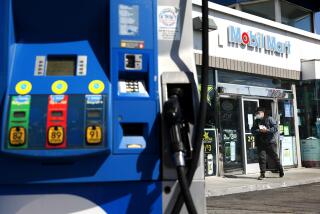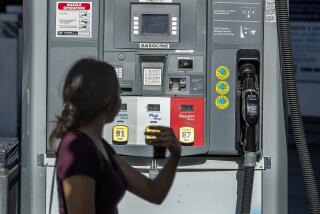EARNINGS : Drop in Refinery Profits Squeezes Big Oil Companies : Energy: Quarter’s results are blamed on a jump in crude prices, steady prices at the pump.
- Share via
An early summer squeeze on refinery profits has caused a sharp drop in major oil company earnings in the second quarter, with the latest to report--San Francisco-based Chevron Corp.--disclosing a 54% fall in operating income.
The second-quarter results came mostly from a modest jump in crude oil prices without an equivalent rise in gasoline prices at the pump. Unocal Corp. on Monday reported a 43% drop in profit, and Atlantic Richfield Co. a 91% fall, compared to the second quarter of 1993.
West Texas intermediate crude oil, the U.S. benchmark, was below $16 a barrel at the beginning of the quarter but rose above $19 by the end. But in the intensely competitive retail gasoline market, prices at the pump didn’t rise as fast.
This squeezed refinery margins by as much as 30% to 50% at West Coast refineries, according to John Vautrain, manager of the Long Beach office of Purvin & Gertz, a refinery consulting firm. “It hasn’t averaged that bad in a long, long time,” he said.
While crude oil prices rose during the quarter, they did not increase enough to offset the drop in refinery profits for the major oil companies. Even at $19, crude prices were an average of $2 a barrel cheaper than in the summer of 1993.
“Refiners got squeezed on that because they couldn’t pass along the higher prices,” said J. Robinson West, president and chief executive of Washington-based Petroleum Finance Co. “The refining business is a highly capital-intensive, low-margin business.”
Seeing that squeeze coming, many companies made the most of a bad situation by lining up special charges--almost all due to company restructuring--and lumping them into the second-quarter results.
For many companies, “everything but the kitchen sink went in there,” said Holly Gustafson, an energy analyst with NatWest Securities Washington Analysis.
She and other analysts, however, see better earnings across the board in the next quarter as gasoline prices continue to catch up this summer because of increased summer driving and an improved economy. That doesn’t necessarily mean significantly higher prices for consumers.
“You have an extra-strong demand, even for the season, and you have a stronger economy,” said Trilby Lundberg, publisher of the Los Angeles-based Lundberg Survey, which tracks retail gasoline trends. “Prices could go up . . . but more likely they will hover around this level.”
Meanwhile, Vautrain already sees some easing of the squeeze on refinery operations.
“The latest data I have is that margins are improving a bit,” he said.
Among the second-quarter earnings for major U.S. oil companies:
* Chevron Corp. had earnings of $262 million, down from $565 million in the second quarter of 1993. While Chevron declared only $5 million in special charges in the 1994 second quarter, the previous year it recorded $515 million in special charges.
* Phillips Petroleum Co. had earnings of $60 million, compared to $137 million a year ago.
* Exxon Corp. earnings fell to $885 million from $1.24 billion a year ago, when the company had a onetime gain of $210 million.
* Arco’s earnings fell to $24 million from last year’s $271 million. The decline reflects net charges of $154 million for restructuring costs.
* Unocal said earnings fell to $50 million from $88 million a year earlier. The company reported special charges of $15 million this year.
* Mobil Corp. profit dropped to $198 million from $579 million a year ago. It includes an after-tax charge of $315 million. Last year’s second-quarter earnings also included $60 million in special benefits.
* Texaco Inc. had earnings of $115 million, compared to $312 million in the same quarter of 1993. It took a special charge of $119 million.
* Amoco Corp. earnings fell to $410 million from $487 million a year ago. The company took a $256-million after-tax charge against earnings, offset by a gain of $270 million as part of a settlement with the Internal Revenue Service.
More to Read
Inside the business of entertainment
The Wide Shot brings you news, analysis and insights on everything from streaming wars to production — and what it all means for the future.
You may occasionally receive promotional content from the Los Angeles Times.










